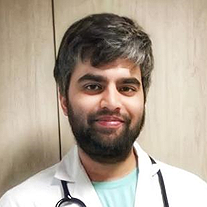Countering Ageism: A Non-Traditional Medical Student's Journey

Ageism refers to stereotypes (how we think), prejudice (how we feel), and discrimination (how we act) based on age. Ageism exists in our institutions, our relationships, and ourselves, and it affects us from childhood into adulthood. It has an impact on all aspects of people's health, and it costs individuals and society billions of dollars.1
A 2020 study in the US showed that ageism led to excess annual costs of $63 billion and resulted in about 17 million more cases of the eight most expensive health conditions for those over the age of 60 in one year.2
I found my love for medicine rather late in comparison to my peers. At the age of 26, I started preparing for the Indian Medical Entrance Exams. It was a difficult process and I, initially, received a lot of discouragement from friends and relatives with respect to my age and the length of the training. However, they eventually supported my decision upon seeing my determination.
I applied in 2017, only to find that the regulatory authority had just passed a new rule prohibiting those beyond the age of 25 from pursuing medicine. I experienced a myriad of feelings at the time; ranging from disbelief to anger to disillusionment.
I joined a group of students to challenge this systemic ageism in the Supreme Court.3 Finally, after a lengthy legal battle, we were permitted to apply, but for that year alone. Older applicants would have to endure the same legal struggles again the following year.
This legal struggle led me to research the medical education system of other countries. I discovered that countries such as the United States, United Kingdom or Canada did not have any age limits on studying any discipline or pursuing any profession. In fact, it's illegal to do so! Many universities in the UK run special access programs for mature students to support their entry into medicine. In the US, the Age Discrimination Act of 1975 prohibits discrimination based on age in programs or activities that receive federal financial assistance.4
After a rigorous search, I had my mind set on Italy. The Italian education system follows the principle of inclusion and education at all levels, is open to everyone, including both Italian citizens and foreigners. After passing the necessary pre-admission standardized exam, I found myself in Italy in Nov 2017.
The experience was surreal, being in a foreign country for the first time. I was apprehensive about the whole experience, but everyone from students to professors to other university staff were incredibly helpful and approachable. I found many "older" students studying medicine and other courses without discrimination of any kind and integrating well within the system.
Non-traditional applicants are already overcoming many barriers (social, psychological, and financial) on their path to medical education. They deserve a fair and equal chance to pursue their aspirations and bring in the much-needed diversity that comes with the eclectic thought processes of varied age groups into the field of medicine.
In the end, I'd say the journey in medicine is long and arduous, but it's an honor and privilege to care for people and that makes it worthwhile.
References
- World Health Organisation. Ageing: Ageism. www.who.int. Published March 18, 2021. Accessed May 10, 2022. https://www.who.int/news-room/questions-and-answers/item/ageing-ageism
- Levy BR, Slade MD, Chang E-Shien, Kannoth S, Wang SY. Ageism Amplifies Cost and Prevalence of Health Conditions. The Gerontologist. 2018;60(1). doi:10.1093/geront/gny131
- Roll back age criteria for NEET 2017: Petition filed in apex court. India Today. Published February 10 2017. Accessed May 10, 2022. https://www.indiatoday.in/education-today/news/story/neet-2017-960055-2017-02-10
- Age Discrimination Act of 1975 | U.S. Department of Labor. Accessed May 10, 2022. https://www.dol.gov/agencies/oasam/regulatory/statutes/age-discrimination-act

This article was written by Praveen Kumar Pandey, a medical student at the University of Pavia, Italy, Class of 2024. Twitter: @pkcardio.
This content was developed independently from the content developed for ACC.org. This content was not reviewed by the American College of Cardiology (ACC) for medical accuracy and the content is provided on an "as is" basis. Inclusion on ACC.org does not constitute a guarantee or endorsement by the ACC and ACC makes no warranty that the content is accurate, complete or error-free. The content is not a substitute for personalized medical advice and is not intended to be used as the sole basis for making individualized medical or health-related decisions. Statements or opinions expressed in this content reflect the views of the authors and do not reflect the official policy of ACC.